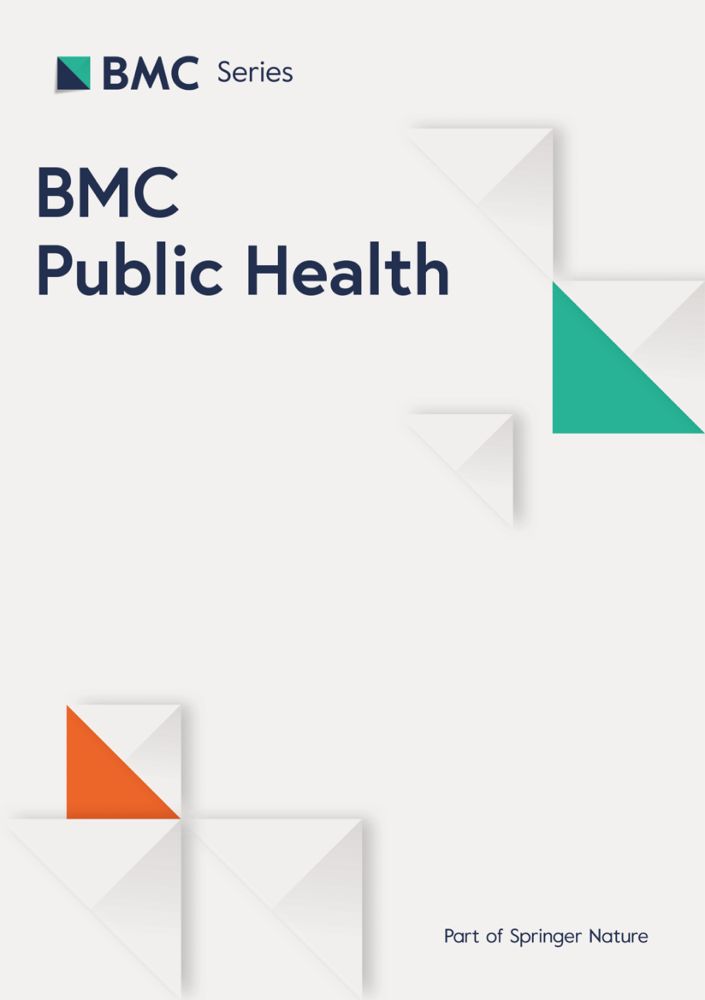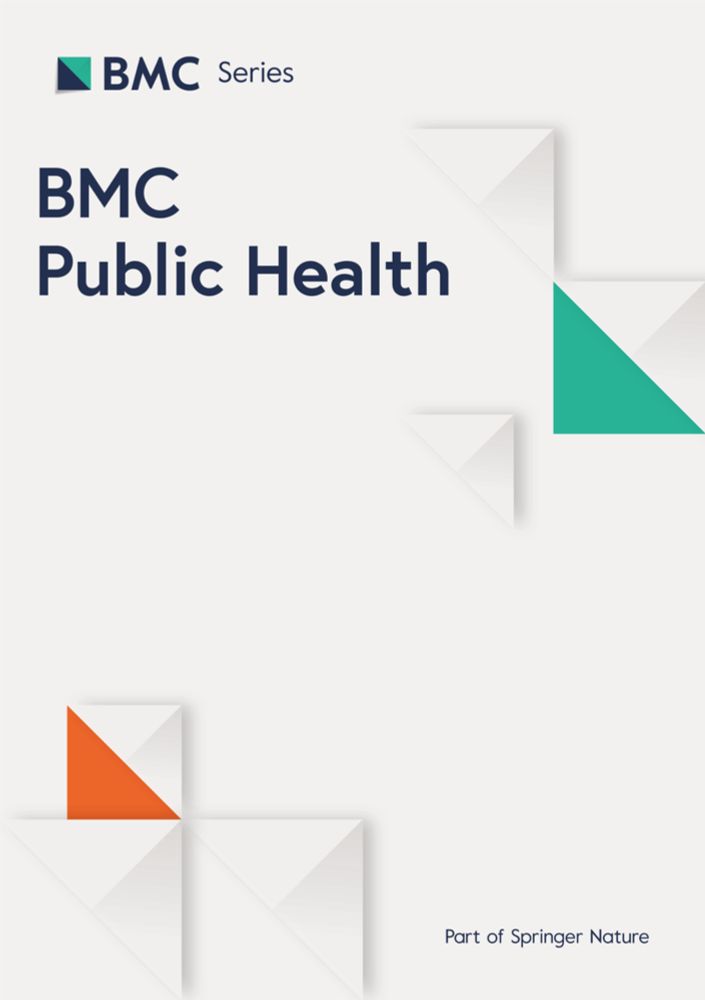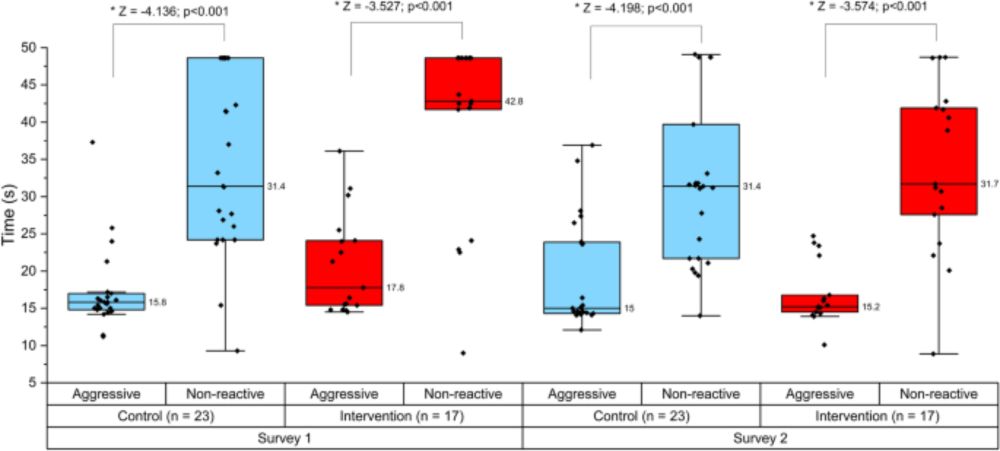Being a horse vet is very dangerous.
Please don't ask your vet to 'have a go' in order to avoid sedating your horse.
If your vet recommends sedation it's for the safety of the vet, the owner and the horse.
14.01.2025 10:51 — 👍 8 🔁 3 💬 3 📌 0
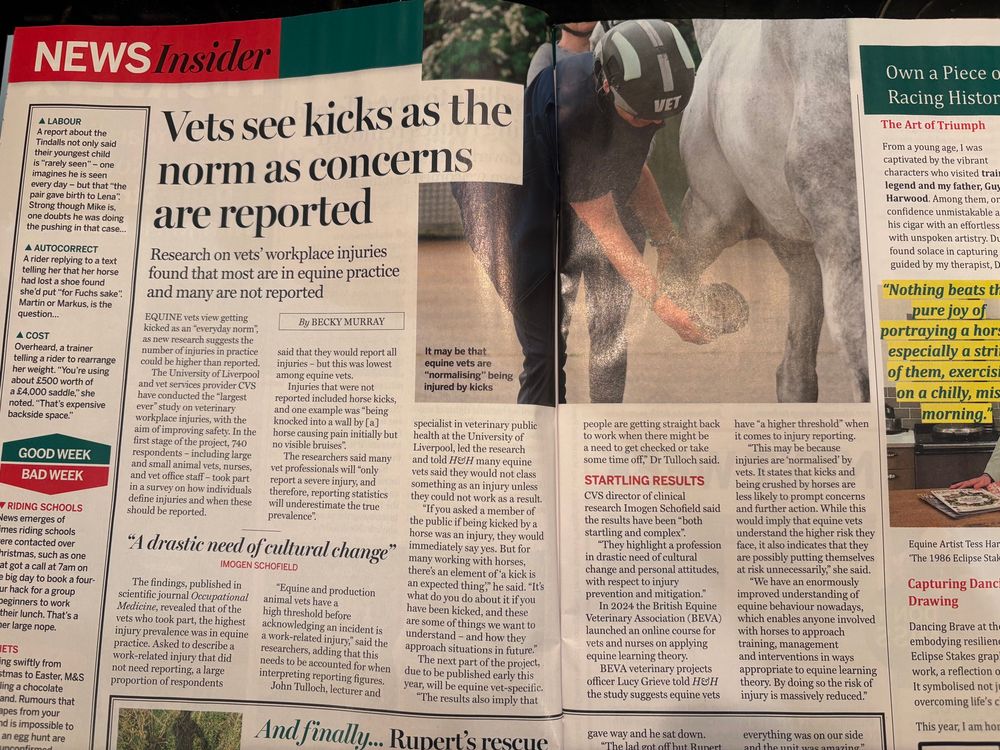
Our recent study on how vets define workplace injuries has been picked up by Horse & Hound
>20% said something was only an injury if couldn’t carry out work as normal. 19% said they wouldn’t report any injury
article: www.horseandhound.co.uk/news/equine-...
Paper: doi.org/10.1093/occm...
14.01.2025 08:54 — 👍 3 🔁 1 💬 0 📌 1
Thanks again to the amazing author team and to
@LUVS_INSPIRE
Here is the paper again:
doi.org/10.1186/s128...
If you have any thoughts and questions, would love to hear them!
10.05.2024 14:54 — 👍 0 🔁 0 💬 0 📌 0
Conclusions:
Vet students are at increased risk of contracting zoonotic diseases, esp on farm
There are cultural issues re: how the vet profession view workplace infections!
Attitude & behaviour change is needed to reduce the risk to students & normalise illness reporting
10.05.2024 14:53 — 👍 1 🔁 0 💬 1 📌 0
Results:
Students: accepted the risk of a zoonosis
Reluctant to take time off to recover
Did not report their infections
Unaware of appropriate PPE usage and infection control practices
Sense of bravado was normalised and necessary!
Evidence of 'maladaptive coping strategies'
10.05.2024 14:52 — 👍 1 🔁 0 💬 1 📌 0
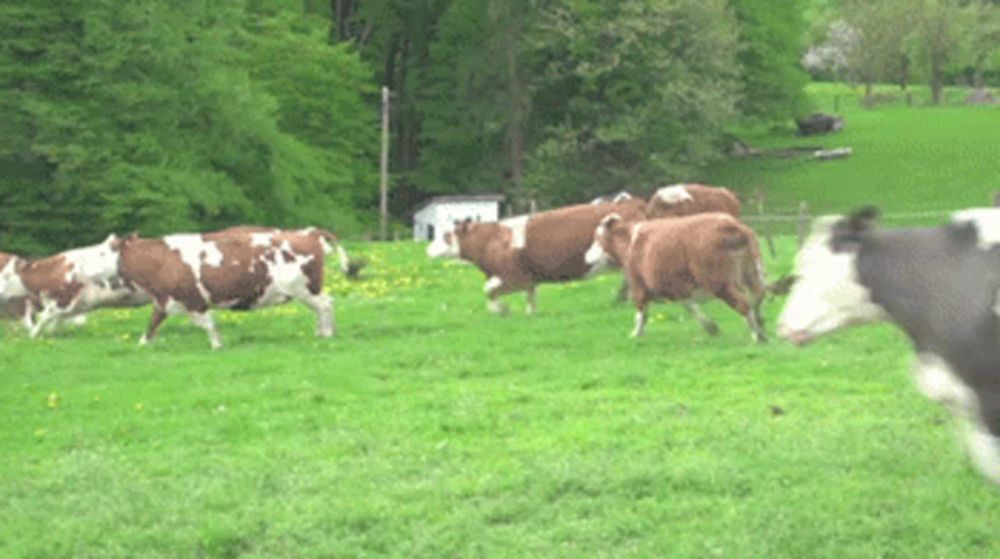
Gates Open Moo GIF
ALT: Gates Open Moo GIF
Results:
Almost 500 students responded
32% had reported having had a zoonosis whilst on their degree
Crypto was the most commonly reported
91% of infections were acquired on farm placements
10.05.2024 14:50 — 👍 0 🔁 0 💬 1 📌 0

Genius Smart GIF
ALT: Genius Smart GIF
Methods: We sent out an in depth survey to vet students in and . This was analysed with a mixture of quantitative and qualitative approaches
10.05.2024 14:49 — 👍 0 🔁 0 💬 1 📌 0
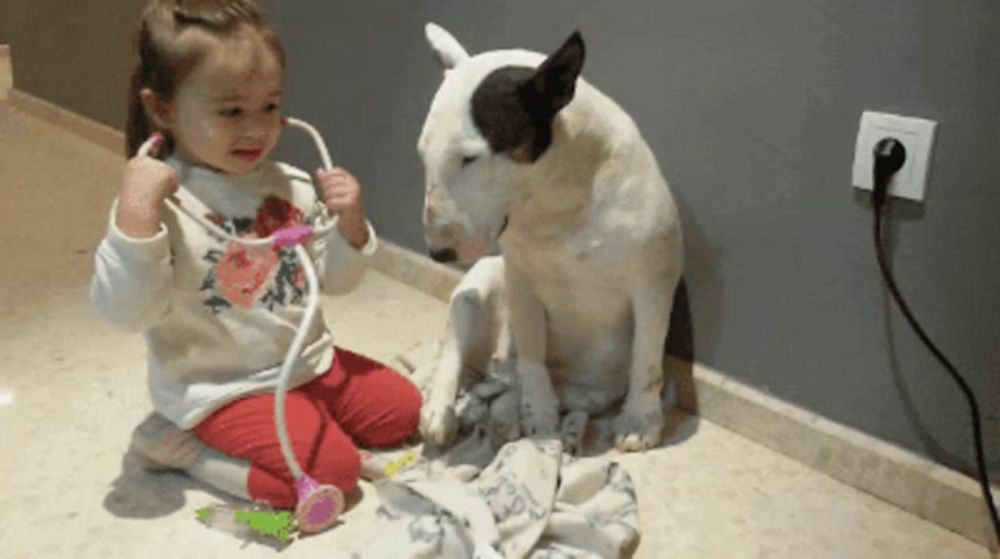
Kid Doctor GIF
ALT: Kid Doctor GIF
Aims: Vet students are exposed to so many different animals during their training and so there is the potential for zoonotic infection (ie a disease acquired from an animal). We wanted to know how common this was in UK and Irish vet students
10.05.2024 14:48 — 👍 0 🔁 0 💬 1 📌 0
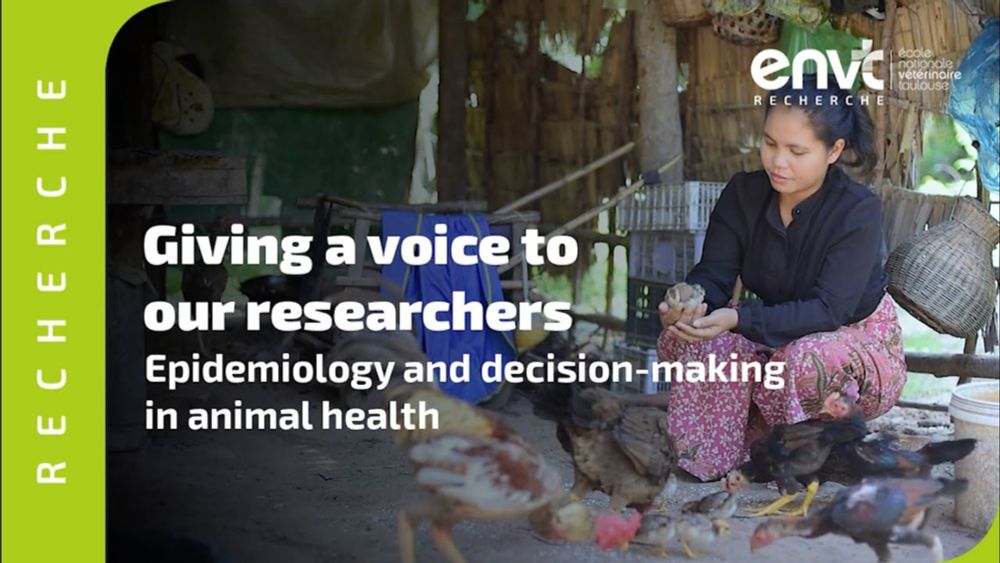
Epidemiology and decision-making in animal health
Epidemiology is a scientific discipline aiming at understanding the factors that influence the distribution of diseases in populations to provide scientific evidence to policy-makers.
🎬 Check out in video what doing research in #veterinary epidemiology in our team means!
t.co/y3PBRQrjbe
06.02.2024 11:10 — 👍 2 🔁 1 💬 0 📌 0
A big cultural change needs to occur across our profession.
We are decades behind the practices and cultures of many other professions.
We should be striving to look after both our physical and mental health.
Fin
15.12.2023 12:57 — 👍 0 🔁 0 💬 0 📌 0
This is the first output from our CVS funded project exploring veterinary work-place injuries.
I implore you to read some of the quotes in the paper, as they are shocking.
Future output is even more concerning than what is captured here. doi.org/10.1101/2023...
6/n
15.12.2023 12:57 — 👍 0 🔁 0 💬 1 📌 0
Impact:
Injury reporting systems are likely to significantly under-represent the true incidence of injuries
It highlights a cultural issue about what is deemed an injury, what practices are deemed 'everyday risks', and the importance of recording and reflecting on injuries.
5/n
15.12.2023 12:56 — 👍 0 🔁 0 💬 1 📌 0
Most will only report injuries if blame can be attributed to something/someone else (ie dog bite), but will not report injuries that were caused by themselves.
A concerning number of people thought that needlesticks were minor injuries and do not need reporting
4/n
15.12.2023 12:56 — 👍 0 🔁 0 💬 1 📌 0
In essence, each sector of the profession defines injuries differently. Most notably that equine and farm vets define something as an injury if they either need significant medical treatment or will take time off work
3/n
15.12.2023 12:55 — 👍 0 🔁 0 💬 1 📌 0
As not peer-reviewed yet, I will not delve into too much depth, so please read and let me know your thoughts.
2/n
15.12.2023 12:55 — 👍 0 🔁 0 💬 1 📌 0
🚨New pre-print 🚨
Pain, inconvenience, & blame: Defining work-related injuries in veterinary workplace
doi.org/10.1101/2023...
Funder: CVS UK Ltd
Written with amazing co-authors!
Thread to follow 1/n
15.12.2023 12:55 — 👍 2 🔁 1 💬 1 📌 0
MP for Winchester | Liberal Democrat spokesperson for Mental Health | Veterinary Surgeon 🩺
Get my newsletter - https://dannychambers.org.uk/newsletter
Wildlife Health researcher @ Melbourne Veterinary School; lives and works on Dja Dja Wurrung, Wurundjeri and Bunurong country; substandard violin player; voracious reader and chocolate aficionado.
Infectious Diseases Doc. Views my own..
Public Health #Bioinformatician. Wants to sequence ALL THE THINGS. Personal account with alternative spellings and grammar structures. She/her
Assoc. Prof. @ Penn_state (but views are my own) || Vet Entomology || Parasites of #wildlife, #horses, #livestock || Disease Ecology || One Health
Postdoc at UMR IHAP. Former postdoc at Royal Veterinary College and PhD student at LBBE Lyon. Interest in epidemiology and modelling of infectious diseases, zoonoses and NTDs.
🇲🇫 Veterinarian
👨🎓 PhD student (epidemiology, management sciences)
🦆 Duck enthusiast (who isn't?)
PhD student at INRAE 🇫🇷
🦠 HPAI
🦢 Wild birds
🧬 Phylodynamics
Researcher in infectious disease dynamics, somewhere between stats math and epi @INRAE-ENVT || Enthusiast of record shops, bookstores, and cafes, especially if there's a cat || Team oxford comma, even more team em-dash.
Animal welfare veterinarian, general practitioner, and lecturer in the Sydney School of Veterinary Science. Co-author of Veterinary Ethics: Navigating Tough Cases (5M) and the Veterinary General Practice Casebook: Small Animal Clinics (Taylor & Francis)
DVM MPH PhD / Epidemiologist / Infectious diseases / Mechanistic modelling / Spatiotemporal modelling / wildlife / livestock
Vet epidemiologist & data lover 🪩
🎓 Zoology (BSc)
🎓 Veterinary Epidemiology (MSc)
🐶🐹🍁🪐🎮📚
Space journalist, rocket chaser, storyteller. Advocate for diversity and women in STEM. ISU SSP12. Alter-ego of @radiokate.com
www.youtube.com/@NTKSpace
Quantitative ecologist, sometime epidemiologist and modeller. Leader in Biodiversity and Health at the Natural History Museum, London, UK.
💻 Computer Scientist, 📈 Computational/Mathematical Modeller, 🦠 Infectious Disease Modeller,🔬Research Fellow / Core Scientist, 🐑 Roslin Institute, 🏰 University of Edinburgh, 🌄 Mountaineer, 🚲 Cyclist, 🤓 Geek.
🔗 https://banks.ac/
Researcher in mathematical epidemiology & infectious disease modelling.
Affiliations: Civic Health Innovation Labs (CHIL) @livunichil.bsky.social, @thepandemicinst.bsky.social, @livuni-phps.bsky.social, @livuni-iph.bsky.social, @liverpooluni.bsky.social.
Associate professor in cattle population health and epidemiology at Oniris, Nantes Atlantic College of Veterinary Medicine, Food Science and Engineering in France.
One Health & Planetary Health Teaching Fellow at University of Edinburgh | Human Behaviour Change | Animal Welfare
PhD student in public health: interested in qualitative research, infectious disease, emerging and zoonotic infections, pandemic preparedness, global equity, health systems, and policy

